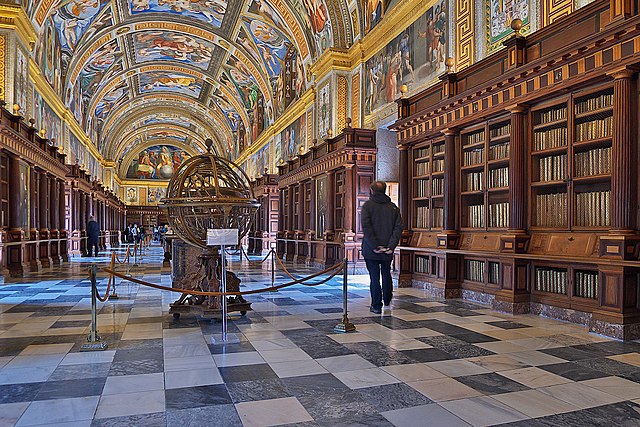The Library of El Escorial, Spain

This old library is located in the Royal Site of San Lorenzo de El Escorial, the historical residence of the king of Spain.
It is situated on the Guadarrama mountain range at the foot of Mount Abantos. El Escorial is in the town of San Lorenzo de El Escorial, about 45 kilometers (28 miles) northwest of the the city of Madrid, Spain. It is a monastery, royal palace, museum, and school. King Philip II of Spain (1527–1598) started the library by donating his own personal collection of books. The important Spanish architect Juan de Herrera (1530–1597) designed the building. Philip II hired the Italian painter Pellegrino Tibaldi to paint frescoes on the vaulted ceilings. The paintings represent the seven liberal arts: rhetoric, dialectic, music, grammar, arithmetic, geometry and astronomy. Today the library houses over 40,000 volumes, including many rare and valuable illuminated manuscripts. The books are stored in a hall fifty-four meters long, nine meters wide and ten meters high. This impressive site is further decorated with gray marble floors and carved wooden shelves created by one of the great wood carvers of the time, Giuseppe Flecha y Gamboa. When Phillip II was alive, a whole room contained manuscripts in Latin, Greek, Arabic, Aramaic, Italian, French and Spanish. In 1984, UNESCO declared San Lorenzo de El Escorial a World Heritage Site. Over half a million visitors admire its beauties every year and enjoy the fact that its location in the mountains makes the site considerably cooler in the summer than surrounding cities. The Spanish people feel strongly attached to El Escorial. The philosopher Miguel de Unamuno said after a visit that El Escorial is a
place that all Spaniards, who have a historical conscience of what it means to be Spanish, should visit at some time during their lifetime, as devout Moslems visit Mecca.
Thailand and Spain.
In 2006, King Juan Carlos of Spain visited Thailand and made a speech at the Siam Society in Bangkok. The Spanish King’s appearance was in connection with the publication of the first-ever Thai language edition of the famous Spanish novel Don Quixote, which he officially presented to HRH Princess Maha Chakri Sirindhorn. Written by Miguel de Cervantes and published in 1605, Don Quixote is Spain’s literary gift to Thailand, in the words of King Juan Carlos, who called Cervantes a cultural ambassador to Thailand. Readers all over the world have long been fascinated by the tragic-comic story of a deluded old man who reads too many books about knights of old, and decides to become one. Traveling with his friend and companion Sancho Panza, Don Quixote encounters many disappointments, but wins the reader’s sympathy for his courage and resolve. The TU Libraries own a number of translations of Don Quixote and books about its author Cervantes.

The story of Don Quixote has also often been told in films and in musical versions such as Broadway’s Man of the La Mancha with the hit song which begins, To Dream the Impossible Dream…
Why read Don Quixote?
King Juan Carlos told the Thai audience in Bangkok:
Cervantes’ masterpiece, which you can now read in your beautiful language, is embraced as part of their heritage by all of the peoples that make up the great concert of Hispanic culture…From the very beginning of the modern era, during the first half of the sixteenth century, Spain had news of your lands, thanks to the tales of sailors and explorers…Another Spaniard, an Andalusian from the town of San Lucar de Barrameda, manservant to His Majesty the King of Siam, later reported on the customs of the court, and his countrymen were astonished by these tales of great elephants tied with chains of gold and horses bedecked with jewels and pearls.
King Juan Carlos also paid tribute to Professor Swangwan Traicharoenwiwat of Ramkhamhaeng University, who translated the massive novel Don Quixote from Spanish into Thai language. Among other scholarly accomplishments, Swangwan has also written a Thai-Spanish dictionary.
Learning foreign languages.
King Juan Carlos concluded that learning foreign languages “eases communication; but it also encompasses a higher value, that of serving as the key to opening the doors of exchanging philosophical and spiritual values. We have come to Thailand in a spirit of strengthening our ties of friendship and cooperation, and in this spirit today’s event seems to us highly significant.”

(all images courtesy of Wikimedia Commons).

